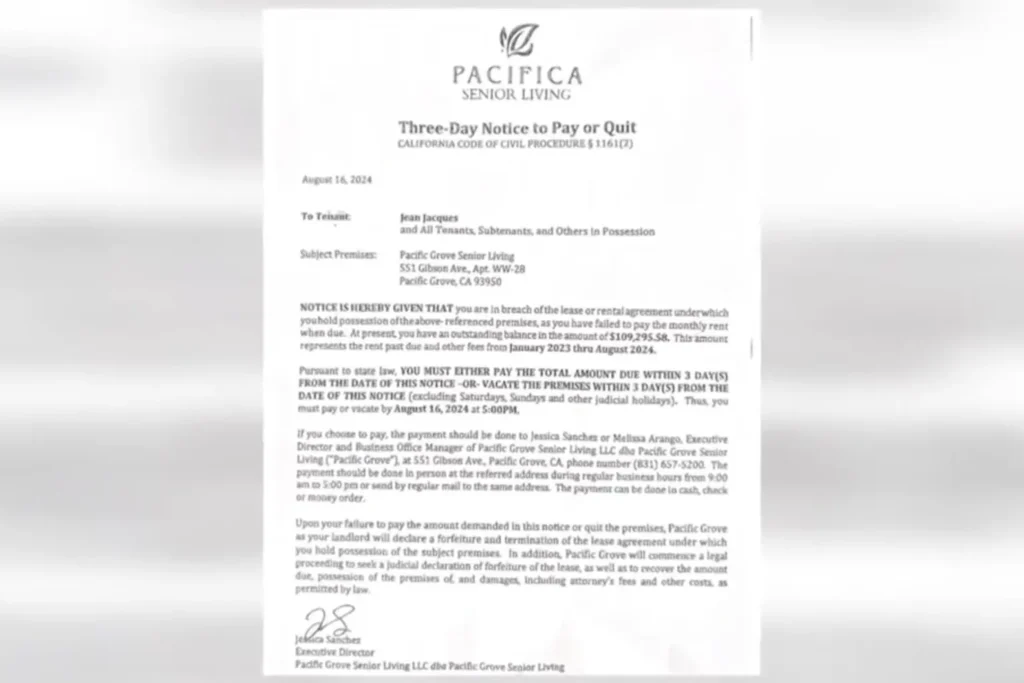Introduction
In a dramatic turn of events, Pacifica Senior Living has withdrawn its eviction notice against 96-year-old Jean Jacques, a longtime resident of its Pacific Grove facility. The reversal comes after California Attorney General Rob Bonta launched an investigation into the eviction, which had sparked public outrage and widespread media attention. Jacques, who believed she had a lifetime contract guaranteeing her stay at the facility, faced being forced out of the home she had known for over two decades. The case has drawn attention to the rights of senior citizens in care facilities and the responsibilities of new owners to honor existing agreements.
Jean Jacques’ Long Journey with Forest Hill Manor
Jean Jacques moved into Forest Hill Manor in Pacific Grove, California, in 2002. To secure her place in the facility, she paid a $250,000 down payment and agreed to a monthly rent of $5,000. This arrangement was meant to ensure she could live at the facility for the rest of her life, even if her financial resources ran dry. Jacques believed that the contract she signed with the original owners, California-Nevada Methodist Homes, guaranteed her this security. For 22 years, Jacques lived in the community, developing deep ties with her neighbors and the staff.
However, in 2022, the situation took a dramatic turn. California-Nevada Methodist Homes went bankrupt, and Pacifica Senior Living, a for-profit company, purchased the facility. The sale included a clause requiring Pacifica to honor existing contracts, including Jacques’. Despite this, the new owners issued her a three-day eviction notice on August 16, 2024, demanding $110,000. This sudden and unexpected action left Jacques and her advocates stunned.
Public Outcry and Legal Challenges
The eviction notice quickly drew widespread attention. Major media outlets, including the New York Post, picked up the story, and the public reaction was swift and furious. Many were outraged that a vulnerable 96-year-old woman could be treated in such a manner, especially after she had paid so much into the facility over the years. The story struck a chord with many who feared that similar situations could happen to their loved ones or themselves in the future.
Patricia McGinnis, founder of California Advocates for Nursing Home Reform, was one of the most vocal critics. She pointed out that the eviction notice was not only morally questionable but also legally flawed. According to McGinnis, the notice failed to comply with California state laws regarding eviction procedures for senior residents. It did not include necessary information on how Jacques could appeal the eviction, which is a requirement under the law. “This eviction notice is grossly insufficient,” McGinnis said, emphasizing the need for stronger protections for seniors in care facilities.
Attorney General Bonta’s Intervention
As public pressure mounted, California Attorney General Rob Bonta took notice. Bonta, whose office had approved the sale of the facility in 2022, launched an investigation into the eviction. Recognizing the urgency of the situation, Bonta’s office began exploring ways to ensure Jacques could stay in her home during the investigation. The Attorney General expressed sympathy for Jacques and underscored the importance of honoring lifetime contracts, particularly for vulnerable seniors who have devoted their lives and resources to these agreements.
“We are aware of the individual. It’s tragic, and we’re sympathetic,” Bonta said in a public statement. “Right now, it’s an ongoing investigation for us, and we’re looking at ways to help accommodate her.”
The investigation by Bonta’s office sent a strong message to Pacifica Senior Living and other similar facilities: the state would not tolerate actions that jeopardize the well-being of senior residents, especially when legal and ethical obligations are at stake.
Pacifica Senior Living Reverses Course
Under immense pressure from both the public and the Attorney General’s office, Pacifica Senior Living announced on August 30, 2024, that it would withdraw the eviction notice against Jean Jacques. The company agreed to honor the original lifetime contract, allowing Jacques to remain in her apartment for the rest of her life. This decision was met with relief and joy by Jacques, her family, and her supporters.
Bob Sadler, president of the Pacific Grove Senior Living Residents’ Association, confirmed the reversal. “Jean received word that she would be able to stay in her apartment for the rest of her life, as originally promised,” Sadler said. He also expressed hope that this case would lead to greater protections for other residents facing similar situations.
Jean Jacques herself expressed a mix of relief and determination. “They’ll have to drag me out of here screaming and hollering,” she had said defiantly when the eviction notice was first served. Now, she can stay in the home she has known for more than two decades, surrounded by the community she loves.
The Broader Implications
This case has far-reaching implications for the senior care industry, particularly regarding the treatment of residents when facilities change ownership. The swift reversal by Pacifica Senior Living demonstrates the power of public advocacy and the critical role that legal oversight plays in protecting vulnerable populations. It also highlights the importance of clear and enforceable contracts in senior care, ensuring that residents can live out their lives with dignity and security.
The outcome of this case may set a precedent for how similar disputes are handled in the future. Advocates for senior citizens are hopeful that it will lead to stronger legal protections and more rigorous oversight of senior care facilities, particularly those undergoing ownership changes.
Conclusion
The reversal of Jean Jacques’ eviction is a significant victory for her and for senior citizens across California. It underscores the importance of protecting the rights of elderly residents and holding care facilities accountable for their obligations. As Attorney General Bonta continues his investigation, many hope that this case will serve as a catalyst for positive change in the senior care industry, ensuring that no other resident faces the same uncertainty and fear that Jacques experienced.


